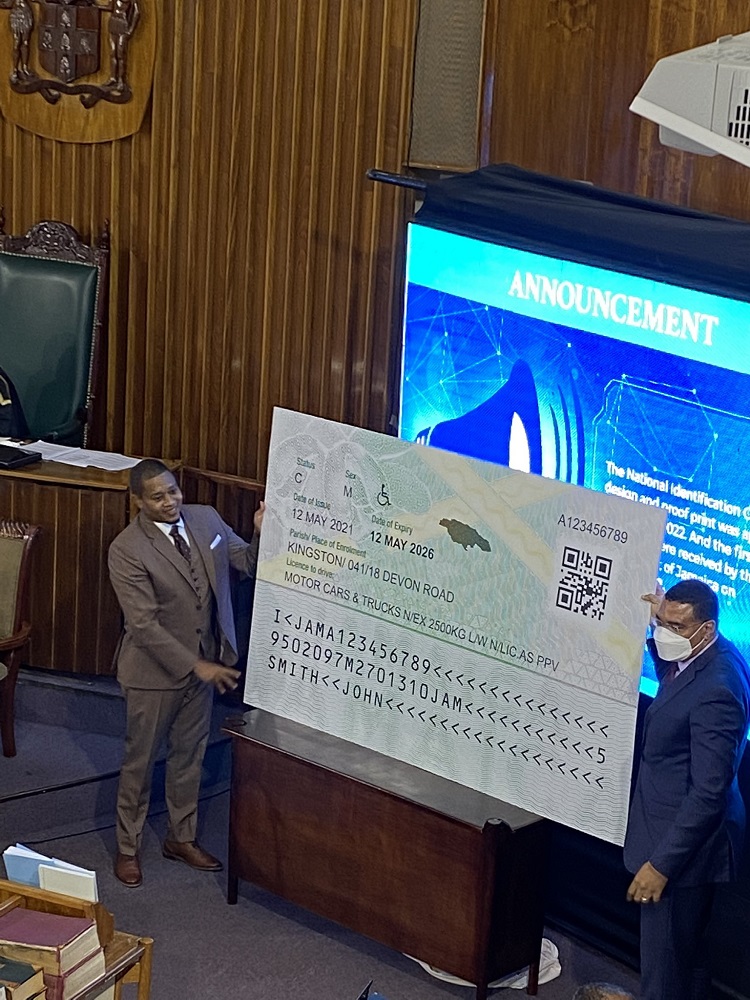

The following is an excerpt from the contribution to the 2022-2023 Sectoral Debate of Floyd Green, minister without portfolio in the Office of the Prime Minister, outlining the safety and security of the National Identification System.
I cannot stress enough that our National Identification System will provide a safe, convenient and reliable means for persons to prove their identity while aiding in the furtherance of the digitalisation of Government.
This will reduce bureaucracy and encourage efficiency, more importantly it will make life easier for our citizens.
Enrolment in the National Identification System is voluntary and will certainly be supported by the rollout of a robust public education campaign to encourage take-up by all eligible persons.
Allow me to update the House on where we are:
So far, the National Identification System which is the software to power our card roll out and includes enrolment, vetting, dashboard, card personalisation, pre-enrolment portal, card personalisation system is 90 per cent completed. We expect it will be completed over the next two months.
NIDS Card Production & Enrolment Sites
We have more excellent news. Our National Identification Card Production Centre is 97 per cent
completed and core staff have been recruited to facilitate the pilot of NIDS. All card production staff were subjected to extensive background checks.
The first NIDS enrolment site in Kingston is to be ready by August 2022. An additional five pilot sites in
Kingston will also be ready before year end.

Continuing on a steady trajectory, and expanding beyond the pilot in Kingston and St Andrew, an additional eight sites will be ready by early 2023 in Greater Portmore, Mandeville, Old Harbour, Black River, Morant Bay, Ocho Rios, Port Maria and Montego Bay.
And of course, all other parish capitals will see an additional 11 enrolment sites installed by Mid 2023.
The partnership with Jamaica Post will result in the significant modernisation of 24 post offices islandwide used as NIDS enrolment sites. The transformation is already happening at the central sorting office, Jamaica Post’s largest banking hall, under the leadership of Mr Lincoln Allen.
NIDS Pilot
As mentioned earlier we will be having a National Identification System pilot project so as to ensure that
we address any nuances before a national roll out.
The pilot will target Kingston and St Andrew and a pre-enrolment portal will be made available for applicants to begin the enrolment process and set an appointment.
The Pilot Enrolment Process
The NIDS enrolment process is clear, hassle-free and it marks the start of the next stage of our digitally advanced lives.
Following the pilot, enrolment will be open to all citizens of Jamaica and persons ordinarily resident in
Jamaica.
Allow me to answer some of the questions that we hear daily:
Why a National Identification Card?
Persons often ask why we need an ID and invariably what is the difference between what we have now
and what we will get. The Voter’s ID, which because of the lack of National ID, is normally used in those circumstances.
While it has served us well, it is limited in scope. The Voter’s ID is not available to the entire population, as persons below 18 years of age are excluded from registration.
The Driver’s Licence is even more exclusive as you have to fulfil a specific criterion to access it. The passport is accessible and does collect significant data but also has a cost attached to it.
And, of course, the reality is that all the aforementioned are functional identifications, meaning, they
were created by legislation for specific purposes. They were not designed to ensure that they confirm your identity. That’s why often you need to present two or they have to be supported by a letter from the justice of the peace confirming that you are who you say you are.
By law, section 17 of the National Identification Registration Act says:
“An enrolled individual who is issued a National Identification Card may use the Card as a means of proving that individual’s identity, and where such an individual furnishes the Card to a person
who requires proof of the individual’s identity—
(a) the Card shall be accepted as sufficient proof of the individual’s identity; and
(b) the person shall not require the individual to produce any additional proof of identity.
The National Identification Card is the first ID for everyone.
We can say this by law because the National Identification Card supports strong authentication using digital certificates, fingerprints and facial images as digital credentials, cardholder consent and full onboarding for digital services. Therefore, fingerprints and facial images are crucial to minimise the risks
of duplicate identities.
In other words, fingerprints and facial images guarantee the uniqueness of the registration of identity
in the National Identification Databases. Fingerprints and facial images allow persons to authenticate based on who they are instead of using something they have.
The National Identification Card also is an electronic ID so it will give us the opportunity to move more services online and use the platform of the National Identification System to access these services in a seamless way using other identifiers such as a PIN or password. It underscores the fact that our National Identification System, from data collection to storage, to producing the cards, is a comprehensive
and secure ecosystem.
Additionally the National Identification Card will be offered to persons free of cost.
Will my information be safe?
The answer is yes, the Government is taking every step to comply with international standards and best
practices for data security and privacy. The Government has engaged the Estonians to work with the Project Executing Unit to develop all the security policies and standards for the NIDS.
These standards will be adopted and implemented by the National Identification and Registration Authority (NIRA) during the pilot of NIDS. These security standards are hinged on ISO27001.
We have also engaged a Jamaican cybersecurity firm to participate in the hardening of the National Identification System. The Jamaican security firm will work concurrently with other international security experts.

The NIDS databases are encrypted by transparent data encryption in fulfilling the requirements outlined in the National Identification and Registration Act 2021.
Transparent data encryption encrypts the data within the database’s physical files, and the audit trails of the system will be protected using Blockchain Technology.
What it means is if there is unauthorised access or unauthorised use, there will be a record that cannot be deleted by NIRA’s officers.
This is a new era of transparency. This is new for Jamaica and can only be good for building public trust. By law, NIRA’s officers are not given the privileges of discretion, as the ‘Requests for information or for
the authentication and verification services’ framework is clearly defined under Section 25 of the National Identification and Registration Act.
The verification of identity is at the individual’s request or an accredited third party with that individual’s consent and cannot be accessed otherwise unless it is by order of the court.
The National Identification System and NIRA have a built-in double oversight mechanism. Under the Data Protection Act, the Information Commissioner, appointed in late 2021, will provide practical monitoring of the NIDS relating to data protection and privacy.
NIRA must register and be monitored as a data controller under the Data Protection Act (DPA), and as
such, NIRA and its officers are accountable under the DPA and must comply with data privacy and security.
We have not stopped there. The National Identification System and NIRA have a built-in double oversight mechanism. Under the Data Protection Act, the Information Commissioner, appointed in late 2021, will provide practical monitoring of the NIDS relating to data protection and privacy.
The next layer of protection is an independent oversight body to be called the National Identification and Registration Inspectorate which will be mandated to monitor the Authority’s compliance with the NIDS law and report its findings directly to the Parliament of Jamaica.
The Inspectorate will also be empowered to take action independently or bring to the attention of the appropriate regulatory/disciplinary body where it is found that the Authority or its employees have
violated the enabling legislation. This will be undertaken by the Electoral Commission of Jamaica, an entity with a proven track record of accountability, transparency and effectiveness.
So, when I say it is safe, we have taken all reasonable steps in keeping with the realities of the world we
operate in and the best practices around to ensure that the prime minister’s personal data, my data, your data, the Leader of the Opposition’s data and all the identification data of our children are protected.







Comments